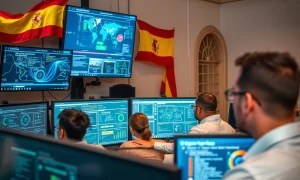When Amr Awadallah learned about the dramatic H-1B visa fee increase to $100,000, the AI startup founder immediately recognized the threat to his company’s growth. “This isn’t just a policy change—it’s a talent tariff that will cripple innovation,” Awadallah told StockPil. His reaction mirrors widespread concern across the startup ecosystem about the H-1B visa program’s accessibility.
Understanding the H-1B Visa Fee Impact
The H-1B visa program traditionally allowed companies to hire skilled international talent for specialized roles. However, the recent fee hike from $2,000-$5,000 to $100,000 per application creates significant barriers. Consequently, startups face unprecedented challenges in accessing global talent pools. This change particularly affects technology companies that rely on specialized skills.
Startup Leaders Voice H-1B Visa Concerns
Many successful entrepreneurs attribute their achievements to the H-1B visa program. Notably, Google’s Sundar Pichai and Microsoft’s Satya Nadella initially came to the U.S. through this pathway. Similarly, Brian Sathianathan of Iterate credits his previous successful exit to H-1B visa holders. “My co-founder and head of engineering both came through the program,” Sathianathan explained. “With these new fees, that success story wouldn’t be possible today.”
Economic Consequences of H-1B Visa Changes
The financial impact extends beyond individual companies. According to industry analysis:
- Previous annual cost: $200-400 million for tech industry
- New projected cost: $5.5 billion annually
- Visa allocation: 85,000 new H-1B visas yearly
- Computer-related jobs: 55,000 visas annually
This dramatic increase could fundamentally alter how companies approach international hiring.
Exploring Alternatives to H-1B Visa
Startups are actively seeking solutions beyond the traditional H-1B visa pathway. Many companies now consider:
- O-1 visas for extraordinary ability candidates
- EB-1A visas for top-field professionals
- Remote international hiring through global teams
- Alternative tech hubs in Canada, Germany, and UK
Jack Thorogood of Native Teams reports a 50% increase in companies exploring visa-free hiring options.
Long-term Innovation Risks
The H-1B visa changes threaten America’s position in global technology leadership. Hemant Mohapatra of Lightspeed Venture Partners warns that immigrant founders create a disproportionate number of successful startups. “Many unicorns and decacorns have immigrant founders,” Mohapatra noted. “This policy could create an innovation gap that benefits competing nations.”
Frequently Asked Questions
What is the new H-1B visa application fee?
The fee has increased from $2,000-$5,000 to $100,000 per application, typically paid by employers.
How will the H-1B visa fee affect startups?
Startups may struggle to afford the increased costs, potentially limiting their access to international talent and hindering innovation.
Are there exemptions to the H-1B visa fee increase?
The administration mentioned possible exemptions for national interest cases, but specific criteria remain unclear.
What alternatives exist to the H-1B visa?
Companies can explore O-1 visas, EB-1A visas, remote hiring, or establishing offices in other countries with more favorable immigration policies.
When does the H-1B visa fee change take effect?
The change technically took effect immediately, though questions remain about applications currently under review.
How many H-1B visas are available annually?
The program offers 85,000 new visas each year, with 20,000 reserved for recent U.S. university graduates.







